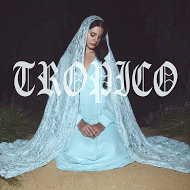Contributed photo
Lana Del Rey’s new 27-minute short film, “Tropico,” was just released on Dec. 5. Directed by Anthony Mandler and written by Del Rey herself, it features three tracks from her “Born To Die – The Paradise Edition” album including “Body Electric,” “Gods and Monsters,” and “Bel Air.”
The film depicts a modern day love story through its ups and downs. It starts off in the wondrous and mysterious Garden of Eden, with Del Rey portraying Eve, and her lover Adam. There are various dream-like, intimate scenes where they are rolling around in the grass, dancing and staring longingly into each other’s eyes, as impersonators of John Wayne, Marilyn Monroe, Elvis Presley, and Jesus Christ are loosely depicted giving monologues.
The innocence of the couple is evident in the first six minutes of the film, and is further heightened as Del Rey affectionately interacts with a lamb and a unicorn. Once she takes a bite out of the forbidden fruit, however, Del Rey falls to her death while her lover follows.
From this point on, the two transition to the world of modern day Los Angeles. There is a compilation of scenes involving pole dancing, smoking, drinking, drugs, a robbery with guns and a raging party, while tattoos, wife-beaters, and cornrows adorn the crowd of people who surround Del Rey and her lover.
At one point during this sequence, the camera focuses on a distant shot of Los Angeles as Del Rey describes the city as the entrance to the underworld, and as the land of gods and monsters. She also recites, “The garden of Eden [was] transformed into the garden of Evil.”
Del Rey and her lover drive away in their convertible, leaving Los Angeles to conclude the final act of the film. Scenes of both Del Rey and her lover being baptized show how they are redeeming themselves from the corrupt lives they had led. This act is about finding paradise again and returning to it.
In regards to the title “Tropico,” director Mandler describes its significance in an interview with Time Magazine by saying, “The word kind of lends itself to a paradise and a paradise lost. Del Rey had always had it in her head as the title.”
Del Rey’s Catholic upbringing and her lifelong curiosity in religion are evident throughout this short film. In the November 2013 issue of Nylon Magazine, Del Rey says that she loved the mysticism and the idea of something more monumental with an idea of a divine plan.
Del Rey said, “For me, the concept of religion transitioned into a really healthy idea of God – I don’t have the traditional views of a conservative Catholic, but my imagination was opened within the big blue-and-gold cathedral walls. I liked the idea of being looked after.”
Although I was hesitant at first, I came to actually enjoy “Tropico.” Something about Del Rey’s spin on the significance of religion and the role it can play in our lives seemed so raw and honest, especially in today’s world that can be so corrupt at times.
I also enjoyed the effervescent love story that she depicted in the film. Del Rey’s take on how true love can still be as alluring and as pure in the world as ever, despite negative outside forces, really says something about the honesty and passion that she puts into her music.
Unless you’re into quirky indie films or you’re obsessed with the “Video Games” singin’ beauty, then I wouldn’t recommend “Tropico” to the average music listener. Del Rey proves, however, that she has the ability to create a work that is appealing to those who enjoy unique and original expression.
Check it out for yourself:


Leave a Reply